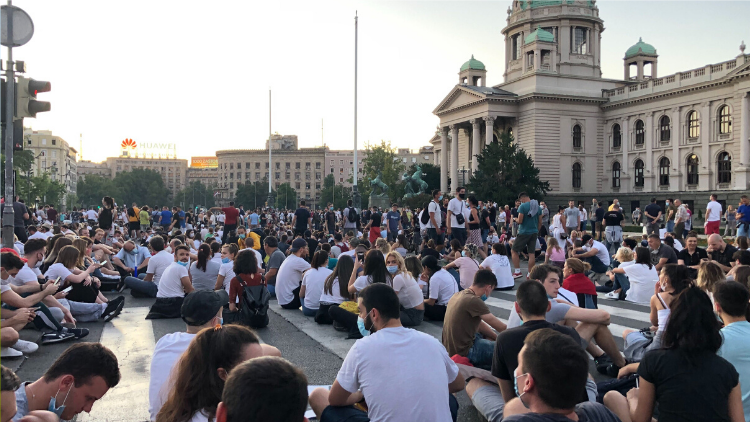Serbia
Was there something?

When the highest number of coronavirus infections (299) and deaths (13) in Serbia was reported on 7th July, President Vučić addressed the public once again with a half-hour speech, followed by a press conference with mostly servile questions from journalists loyal to the government (exception: TV station N1). The main topic were new countermeasures – including the reintroduction of a curfew over the whole weekend of 10th to 13th July.
After this announcement a jolt went through the country. Already the introduction of the first curfew from 19th March to 7th May (on working days between 5 p.m. and 5 a.m., and on weekends from Friday 5 p.m. to Monday 5 a.m.), with a drastic additional restriction for elderly people, upset many citizens.
That same evening, dissatisfied people gathered in front of the Parliament.
On Tuesday and Wednesday, the vast majority of the protesters wanted to continue their protests in a calm and non-violent manner. However, the events on both evenings were to take a different, shocking course. Both on Tuesday, a group of right-wing extremists forcibly entered the Parliament building, and on Wednesday, a street battle with the police provoked by hooligans, resulted in barely justifiable brutal police violence. Political scientist Vuk Velebit summed up the opinion of many observers by saying that the government and the president were the ones who benefited most from this violent development. For example, the protests in the media could be described as „terrorist“, the abusive police violence could be justified and the president could be portrayed as the only “reasonable force” in the country. According to law professor Vesna Rakić Vodinelić, the pictures that now went around the world reminded us of the 1990s – a time that many people in Serbia and the region wanted to leave behind for good.
Even after days it is not possible to determine with certainty whether the protests were spontaneous or organized. There are many indications of spontaneity, at least for the majority of the protesters. Only later did other groups join the protests in order to instrumentalise them for their own goals. For example, the appearance of a protester of Russian origin who was injured by the police on site caused a stir when she declared that she wanted to fight Vučićs dictatorship. Allegedly, in the course of the demonstrations, citizens of other states were also identified, which prompted the government to identify foreign secret services as the masterminds behind the unrest.
The third evening of the protests, unlike the previous two, was peaceful and without violence. The slogan issued by the protesters „Sit down, don’t let yourself be pulled over the barrel!“ was widely followed and proved to be a recipe for success against provocateurs of all stripes, whose potentially aggressive behaviour could have been exposed immediately. Herewith there was also given no reason for police violence. Thousands of young people sitting in front of the Parliament now formed the public image.
On the following evenings, the protests were either provoked by senseless provocations of the right-wing extremists, and subsequent outbreaks of violence by the police with several injured (as on Friday evening), or as funfair-like events without any goal, and with fewer and fewer participants.
Some protesters want to continue to assemble in front of the Parliament and exercise their right to demonstrate, despite a further increase in the number of coronavirus infections and deaths. The news published by the independent press agency BIRN on the day after the elections that the corona figures had apparently been manipulated in the run-up to the parliamentary elections has incited many citizens against the „Vučić system“ and has brought to mind countless old affairs and misdemeanours of state power. In addition, there is an often pathetic and dogmatic president, who likes to attribute his own mistakes to others, as he did now again in the case of the rising infection figures.
The power of the president, who in this situation was not very sovereign and convincing at the beginning of the protests, seemed, if not endangered, then perhaps scratched. The elections of 21st June have undoubtedly strengthened his parliamentary position and expanded his scope for action. The dubious legitimacy and readiness to follow his power apparently got the first cracks, which are likely to get deeper in the course of the foreseeable economic crisis and a perhaps collapsing health system.